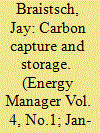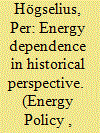|
|
|
Sort Order |
|
|
|
Items / Page
|
|
|
|
|
|
|
| Srl | Item |
| 1 |
ID:
104822


|
|
|
| 2 |
ID:
166340


|
|
|
|
|
| Summary/Abstract |
Studies of energy and geopolitics have been almost totally monopolized by analyses of the largest and most powerful countries in the world. This article argues that it is crucial to include the world's smaller and less powerful nations, too, into the analysis. Adopting a systems perspective, the article discusses Europe's smaller nations that have come to depend on other countries for various activities relating to their fuel supplies, and how they have sought to cope with these dependencies over time. It discusses, in particular, two overarching strategies in this context: first, investments in domestic energy sources, and secondly, efforts to cope with – rather than to reduce – energy imports. Smaller nations have often been more dependent and more vulnerable than the larger countries in the geopolitical energy arena. However, there are numerous exceptions to this pattern, especially in terms of the critical hub positions that a range of smaller nations have managed to secure in the international energy trade. Furthermore, Europe's smaller countries have had a more narrow range of methods at their disposal than the larger countries when it comes to coping with energy dependence – but perhaps not as narrow as commonly believed.
|
|
|
|
|
|
|
|
|
|
|
|
|
|
|
|
| 3 |
ID:
134137


|
|
|
|
|
| Publication |
2014.
|
| Summary/Abstract |
The recent geopolitical events, and primarily those unfolding along the West-Russia trajectory, have dramatically changed the forecast of how long the EU can continue using Russian energy resources. The European countries wish to slowly free themselves from their energy dependence on Russia and make new adjustments to the conceptual approaches to this problem. In particular, the EU has been actively fortifying its position in the Black Sea-Caspian Region by dividing it into two key strategic components-the Southern Caucasus and the Caspian.
The Eastern Partnership Program, which extends to Georgia, Ukraine, Azerbaijan, Moldova, Armenia, and Belarus, has implied close cooperation between these post-Soviet countries and the EU at all levels from the very beginning. The Europeans find these countries easier to understand in historical and cultural terms than the Central Asian countries.
The energy-rich countries (Azerbaijan, Turkmenistan, and Iran) and countries with considerable transit capacities (Turkey and Georgia) have found themselves in the epicenter of the European establishment's attention. At the beginning of 2014, several important new projects for the South Caucasian Region were articulated (Nabucco, Nabucco West, TAP, Shah Deniz-2, and others).
The EU is now faced with making an urgent choice between its former dependence on Russia or undertaking gradual modernization by finding new energy partners. In this respect, the most radical part of European society is willing to engage in any economically promising cooperation (in the form of low energy prices), as long as it is not with Russia or the U.S.
The rest of society holds a more moderate position in favor of diversifying suppliers; it is not against either Russian energy resources or American shale gas, but is also considering alternative energy sources.
It should be noted that, on the whole, the EU inclines more toward the second scenario.
However, after making its South Caucasian choice, the EU is not rushing to invest huge sums in the implementation of the energy projects that, as already noted, are being actively discussed by some countries of the region. Moreover, the American factor continues to play an important role: the U.S. is striving to squeeze Russia out of the European energy zone. In so doing, it is clearly striving to monopolize the European regional gas market.
|
|
|
|
|
|
|
|
|
|
|
|
|
|
|
|
| 4 |
ID:
166339


|
|
|
|
|
| Summary/Abstract |
This article reconstructs the transformation of the Greek energy system during the past hundred years, with a special focus on the dynamics of the country's foreign energy dependencies. The years after World War II saw the rise of domestic lignite and, to a lesser extent, hydropower as the most important energy sources in the country's electrical system, while at the same time the state took a firm grip of energy sector through the establishment of the Public Electricity Company (PPC). We reconstruct how state actors as well as corporate stakeholders organized policies and legitimized energy technologies in search of energy autarky and security while at the same time the energy system – especially in oil and gas – became strongly dependent on imports. Later on natural gas was introduced, being imported mainly from the USSR and Algeria, for substituting highly polluting (imported) oil- and (domestic) lignite-based electricity plants. In recent years gas has offered a new opportunity for Greece to establish itself as a hub in a wider international transmission system. The paper argues that Greek actors defined and redefined energy sources and technologies in relation to political priorities, regimes of competition and broader societal pressures in a way that had a deep impact on Greece's energy import dependence.
|
|
|
|
|
|
|
|
|
|
|
|
|
|
|
|
| 5 |
ID:
163564


|
|
|
|
|
| Summary/Abstract |
n 1900 a Swedish member of parliament argued that Sweden had a Damocles Sword hanging over it due to the country's rapidly growing imports of coal. This energy import dependence has continued to plague Sweden ever since. While coal dominated imports in the first half of the twentieth century, oil and uranium dominated in the second half. This article examines how Swedish public and private actors coped with the country's energy dependence. Several crises prompted such efforts. Coal strikes in the Interwar years and oil embargoes in the 1970s spurred diversification and collaboration with other importing countries. During World War II Sweden built trustful coal relations with Nazi Germany and stockpiled coal. In the post-war era fear of the international oil majors spurred attempts to increase public control over energy imports, and a state-owned company for foreign oil exploration was set up. Moreover, during and after wars and other acute crises Swedish actors intensified their efforts to exploit more of the country's domestic energy resources. However, when the crisis was over it often proved to be cheaper to import energy from abroad. Thus imports have remained high and the Damocles Sword is still hanging over Sweden.
|
|
|
|
|
|
|
|
|
|
|
|
|
|
|
|
|
|
|
|
|